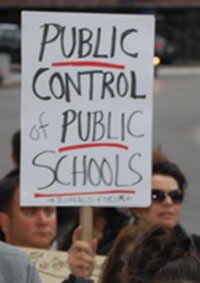Elections 2014
•
Organize for a New Direction in Political Affairs
• Dysfunction, Extremes and More Executive Rule
Organize for a New Direction in Political Affairs
 Election results for 2014 were generally as predicted, with Republicans now having a small majority in the 100-member Senate, currently 52-44 with two independents. This compares to the Democrats previous majority of 53-45 and two independents. Alaska and Louisiana are still undecided.
Election results for 2014 were generally as predicted, with Republicans now having a small majority in the 100-member Senate, currently 52-44 with two independents. This compares to the Democrats previous majority of 53-45 and two independents. Alaska and Louisiana are still undecided.
The monopoly media is presenting the Republican gains in the elections as a referendum against President Obama. No doubt many, from all party affiliations, are angry with Obama.
But the exit polls, and those shortly before the election all indicated something else — voters are angry with government, consider that the country is headed in the wrong direction and do not think their votes matter. This was expressed by Democratic, Republican and independent voters. Polls indicate, for example, that six in 10 say they cannot trust the government in Washington to do what is right. In another 74 percent said they were dissatisfied with the way the nation is being governed. Similarly, 68 percent, or 2/3 say the country is headed in the wrong direction. This is up from about 50 percent who said that in exit polls in 2012. People targeted President Obama and Congress, Republicans and Democrats, the big-money outside contributors and the Supreme Court decisions that opened the financial floodgates for negative advertisements.
The large majority expressed their anger and rejection of the current political set-up by not voting, with turn out in most areas about 40 percent and in some only 25-30 percent. The majority stood firmly with “None of the Above!” Others expressed their anger by refusing to vote for incumbents. Voters across the country uniformly denounced the billions being wasted on the elections and the unending negative ads. These served to discourage people from voting when elections are supposed to encourage participation in political affairs.
Many commented that while they were voting, there were no candidates they wanted to vote for. There was no one that represented their interests and stood for principle. This reflects in part the fact that the system is rigged against having our own worker politicians. Overall, 8 in 10 congressional seats were locks for the incumbent. This stems mainly from the way voting districts are drawn, with both big parties of the rich agreeing to carve them up so one party’s chances are close to zero, and challengers face huge obstacles to participation.
Voters are not the ones choosing the candidates. They are not the ones deciding to have billions spent on advertising. Given the power, people would undoubtedly spend the funds for more important matters, like education. They would also demand that the public airwaves serve the public, by informing the public about the content of a given candidates proposals and outlawing the negative mud-slinging.
The change in majority in the Senate is not going to change a set-up that is designed to keep working people out and rich people in. We need a new direction for political affairs, one that puts empowering the people themselves front and center. We need a set-up where we decide, at our workplaces, universities, senior centers, the agenda and we choose candidates from among our peers to represent that agenda. We need our own worker politicians accountable to us, not the mega donors and monopolies. We need a set-up where elections are a time to inform the public about social problems and engage the public in discussion on their solutions. We need a democracy of our own making, where we, the people, decide! Organizing together today to build these independent politics of the people and a unified fighting front in defense of the rights of all can and must be done!
[TOP]
Dysfunction, Extremes and More Executive Rule
 The Republicans secured a majority in the Senate and also gained seats in the House, where they now have a 243-176 majority, up from 234. The majority in the Senate is not enough to block filibusters (60) or vetoes (67). That in the House is also not enough to prevent a veto by the president (291). This means that even if Republicans succeed in passing legislation in both houses — which remains to be seen given the infighting within and across party lines — President Obama can veto the legislation. Such a situation would likely be seen as worse than the current one, further justifying executive action on Obama’s part.
The Republicans secured a majority in the Senate and also gained seats in the House, where they now have a 243-176 majority, up from 234. The majority in the Senate is not enough to block filibusters (60) or vetoes (67). That in the House is also not enough to prevent a veto by the president (291). This means that even if Republicans succeed in passing legislation in both houses — which remains to be seen given the infighting within and across party lines — President Obama can veto the legislation. Such a situation would likely be seen as worse than the current one, further justifying executive action on Obama’s part.
A change in majority in the Senate does not limit the president’s ability to take executive action. Indeed, given the existing broad anger with government and Congress, it could facilitate the ability of the president to justify the need for executive rule. At least then “something” could be accomplished. Obama has already shown his readiness to do just that, bombing Syria and continuing aggressive efforts at regime change there without Congressional authorization.
In general, there is little reason to expect Congress to become more functional in the coming period, as conflicts within the ruling circles and their representatives in Congress continue to intensify. This is evident from comments by Texas Senator Ted Cruz, who said he will challenge the leadership of Senator Mitch McConnell — who won his election and is expected to lead the new Republican majority. As already seen, even with a sizeable majority in the House the past two years, Republicans were often not able to pass their own legislation.
It is possible Obama and a bloc of Republicans and Democrats, led by McConnell and Democrat Reid, will join together to secure further anti-social attacks, such as those against Medicare and Social Security. The next debt-ceiling debate, for example, coming up in March 2015, could be such an arena. There could be an effort to target “extremes” in both parties and bring forward a bloc that together imposes the cuts. Similarly the sequester budget cuts are due in January and may be another arena for such moves — which will likely be done in the name of “bipartisanship” and overcoming gridlock in Congress. Most tea party Republicans were eliminated in the primaries so those elected are more likely to follow McConnell and those that remain are more vulnerable as “extreme” targets. Obama can use the so-called mandate of the elections to demand that Democrats submit and similarly target those who refuse as “extreme.” The elimination of such “extremes” will be seen as the way to end gridlock. In fact, it will be the means to impose yet more vicious anti-social attacks.
 A change in majority in the Senate will not eliminate the problem of Congressional dysfunction because the source lies elsewhere. The ruling circles have put in place arrangements of governance of executive rule, greatly undermining the power of Congress and effectively rendering it a consultative body at best. The parties no longer function as political parties but rather as gangster-like cartels, constantly at each other’s throats. Private interests, concentrating power in fewer hands while fiercely vying with each other for more power, have directly taken over public institutions. In doing so they have attempted to eliminate the concept of government for the public good. It is a vehicle in their private hands to guarantee their narrow private interests. This includes securing the entire public treasury, public pensions, public lands and buildings, like public schools, and so forth. To whatever degree Congress, or legislatures at any level, stand in the way of such maneuvering, their powers will and are being curtailed and executive rule consolidated.
A change in majority in the Senate will not eliminate the problem of Congressional dysfunction because the source lies elsewhere. The ruling circles have put in place arrangements of governance of executive rule, greatly undermining the power of Congress and effectively rendering it a consultative body at best. The parties no longer function as political parties but rather as gangster-like cartels, constantly at each other’s throats. Private interests, concentrating power in fewer hands while fiercely vying with each other for more power, have directly taken over public institutions. In doing so they have attempted to eliminate the concept of government for the public good. It is a vehicle in their private hands to guarantee their narrow private interests. This includes securing the entire public treasury, public pensions, public lands and buildings, like public schools, and so forth. To whatever degree Congress, or legislatures at any level, stand in the way of such maneuvering, their powers will and are being curtailed and executive rule consolidated.
The danger that presents is not the Republican majority but rather the strengthening of this executive power and the continued elimination of the public, and the public good, from governance. This direction is very dangerous, as the violence, chaos and anti-social character of the Obama administration has already shown, abroad and at home. It is reflected in the broad anger of the public with these elections and with government in general. Blocking this anti-democratic direction demands stepping up the fight to build independent politics of empowerment. It means organizing to oppose executive dictate and demand decision making of, by and for the people themselves as we together defend the rights of all. A democracy of our own making that puts the rights of all, abroad and at home, at the center is the battle of today.
[TOP]
